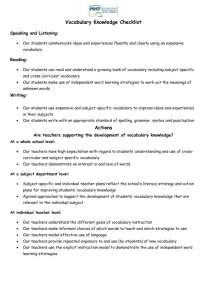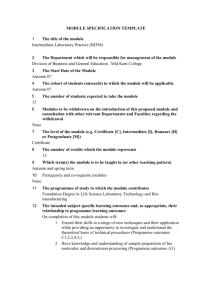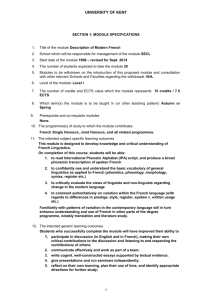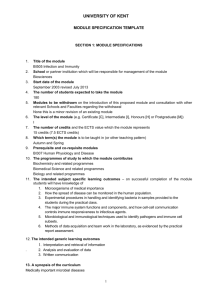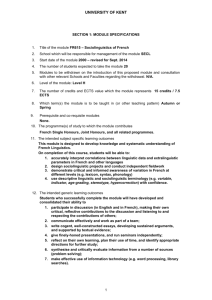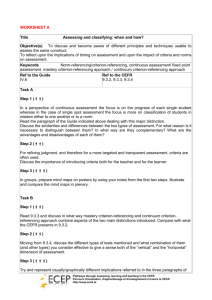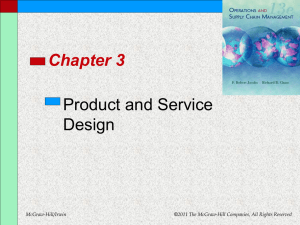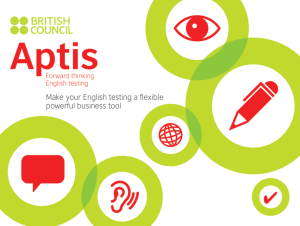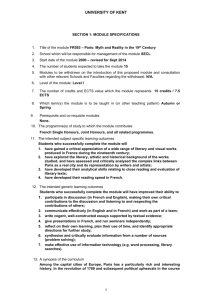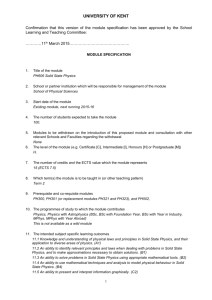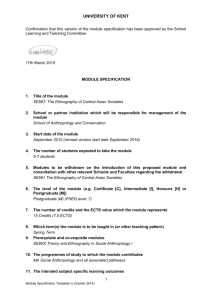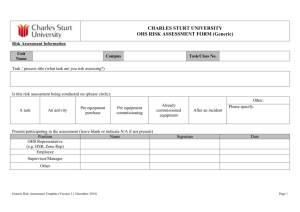FR334 - University of Kent
advertisement
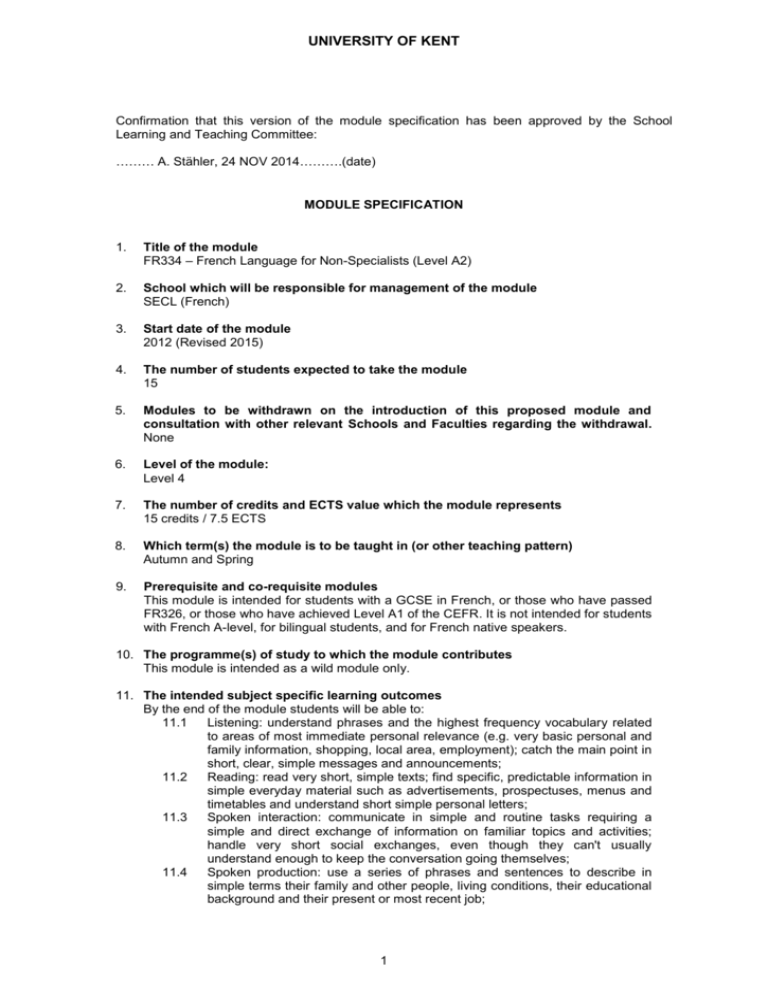
UNIVERSITY OF KENT Confirmation that this version of the module specification has been approved by the School Learning and Teaching Committee: ……… A. Stähler, 24 NOV 2014……….(date) MODULE SPECIFICATION 1. Title of the module FR334 – French Language for Non-Specialists (Level A2) 2. School which will be responsible for management of the module SECL (French) 3. Start date of the module 2012 (Revised 2015) 4. The number of students expected to take the module 15 5. Modules to be withdrawn on the introduction of this proposed module and consultation with other relevant Schools and Faculties regarding the withdrawal. None 6. Level of the module: Level 4 7. The number of credits and ECTS value which the module represents 15 credits / 7.5 ECTS 8. Which term(s) the module is to be taught in (or other teaching pattern) Autumn and Spring 9. Prerequisite and co-requisite modules This module is intended for students with a GCSE in French, or those who have passed FR326, or those who have achieved Level A1 of the CEFR. It is not intended for students with French A-level, for bilingual students, and for French native speakers. 10. The programme(s) of study to which the module contributes This module is intended as a wild module only. 11. The intended subject specific learning outcomes By the end of the module students will be able to: 11.1 Listening: understand phrases and the highest frequency vocabulary related to areas of most immediate personal relevance (e.g. very basic personal and family information, shopping, local area, employment); catch the main point in short, clear, simple messages and announcements; 11.2 Reading: read very short, simple texts; find specific, predictable information in simple everyday material such as advertisements, prospectuses, menus and timetables and understand short simple personal letters; 11.3 Spoken interaction: communicate in simple and routine tasks requiring a simple and direct exchange of information on familiar topics and activities; handle very short social exchanges, even though they can't usually understand enough to keep the conversation going themselves; 11.4 Spoken production: use a series of phrases and sentences to describe in simple terms their family and other people, living conditions, their educational background and their present or most recent job; 1 UNIVERSITY OF KENT 11.5 Writing: write short, simple notes and messages relating to matters in areas of immediate needs; write a very simple personal letter, for example thanking someone for something. 12. The intended generic learning outcomes Students who successfully complete the module will be able to: 12.1 make independent use of resources (such as dictionaries and grammars); 12.2 demonstrate skills of self-expression (written and oral); 12.3 demonstrate mental agility and analytic capacity; 12.4 demonstrate team working ability through group work; 12.5 manage their time and prioritise workloads; 12.6 demonstrate improved confidence in the use of information technology through the use of Web-based language exercises multi-media (specialized sites, Wiki Moodle, MyFolio). 13. A synopsis of the curriculum This module covers level A2 of the CEFR in 24 weeks. This is a wild module available for students with a GCSE in French], or those who have passed FR326, or those who have achieved Level A1 of the CEFR. 14. Indicative Reading List Girardet, J. and Pecheur, J. (2013) Écho A2 Méthode de français, 2nd edition, Paris: Clé International. Girardet, J. and Pecheur, J. (2013) Écho A2 Cahier personnel d’apprentissage, 2nd edition, Paris: Clé International. 15. Learning and Teaching Methods, including the nature and number of contact hours and the total study hours which will be expected of students, and how these relate to achievement of the intended learning outcomes The module is taught by means of 3 weekly seminars. Four topics are covered each week: ‘Interactions’, ‘Resources’ (grammar), ‘Simulations’ (oral/aural skills) and ‘Ecrits et Civilisation’ (written skills and civilization). (All subject-specific learning outcomes; generic learning outcomes 12.15) Seminar preparation is essential. (Generic learning outcomes 12.1, 3-6). Students are also expected to complete all activities indicated in the Timetable of Activities (Moodle). These activities, along with preparation for tests, add-up to 90 hours for the term: that is an average of 4 hours of self-study per week over 24 weeks. Exercises and material are set every week to guide students in their progress, although going beyond what is set will be beneficial. Additionally, optional study material is available in the Multi-Media Labs. Students are encouraged to use the Tell Me More™ software and/or access resources especially selected for FR334/327 at http://www.tregouet.net (all subject-specific learning outcomes; generic learning outcome 12.1, 3-6) Total contact hours: 60 Total notional study hours 150. 16. Assessment methods and how these relate to testing achievement of the intended learning outcomes The module is assessed as follows (100% coursework): 50%: 2 fifty-minute written tests (weeks 12, 24) – assessing ability to use grammar, aural and written comprehension and written production skills; 20%: 2 oral tests (5-10 minutes) – assessing oral production skills 30%: group project (week 24) – assessing ability to use grammar, aural and written comprehension and oral and written production skills, and aspects of French civilization learnt in particular units. The written and oral tests achieve of all subject-specific learning outcomes (11.1-5), and all generic learning outcomes (12.1-6). 2 UNIVERSITY OF KENT 17. Implications for learning resources, including staff, library, IT and space None 18. The School recognises and has embedded the expectations of current disability equality legislation, and supports students with a declared disability or special educational need in its teaching. Within this module we will make reasonable adjustments wherever necessary, including additional or substitute materials, teaching modes or assessment methods for students who have declared and discussed their learning support needs. Arrangements for students with declared disabilities will be made on an individual basis, in consultation with the University’s disability/dyslexia support service, and specialist support will be provided where needed. 19. Campus(es) where module will be delivered Canterbury 3
